
Like many people who write for a living, I'm notoriously anti-AI. However, a new tool from Perplexity is forcing me to reconsider the benefits of using AI as part of my productivity workflow.
✕ Remove Ads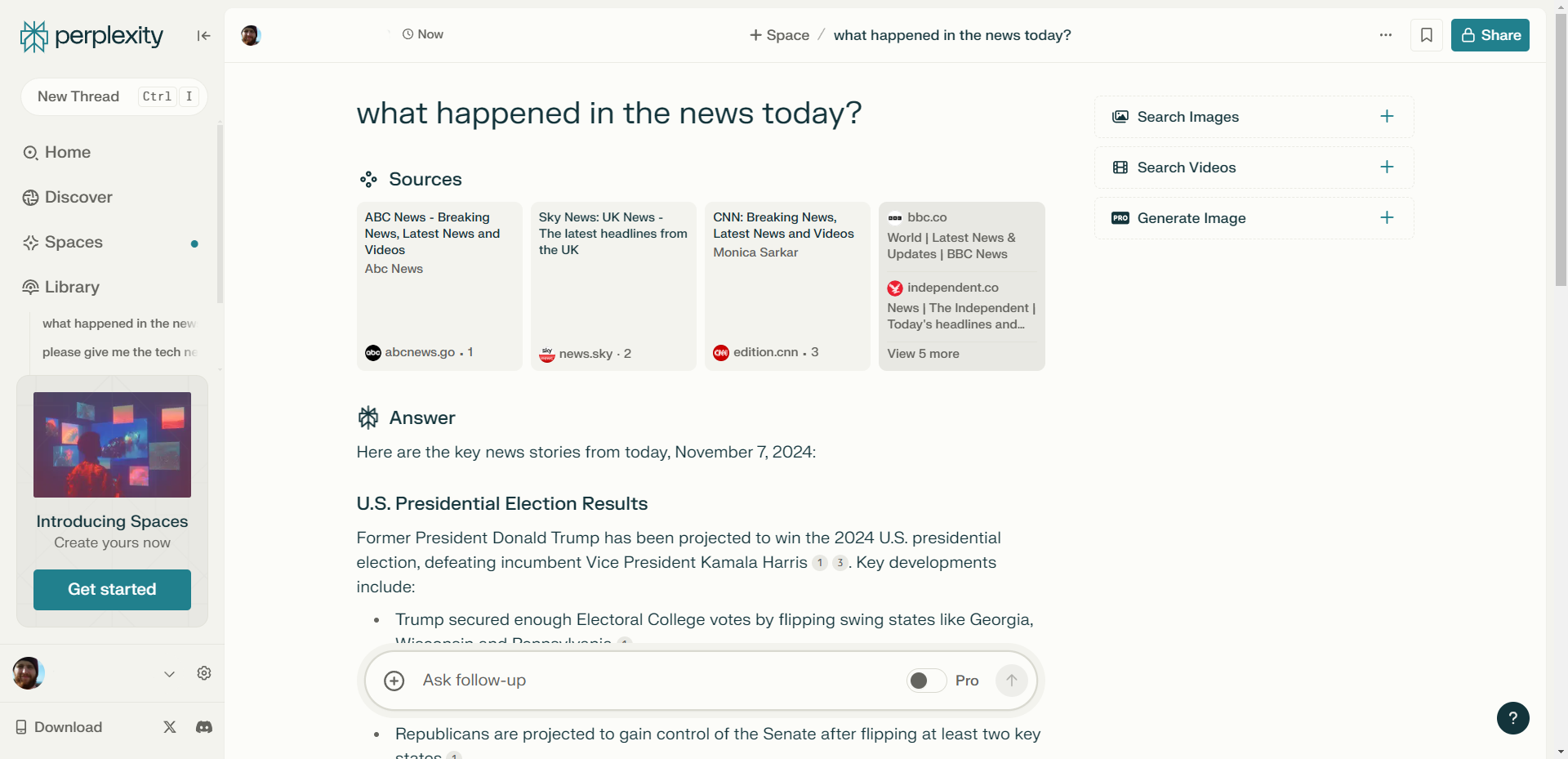
Perplexity AI is billed as the "Swiss Army Knife of information discovery and curiosity." Really, that's a fancy way of saying you can ask it questions, and, using its magic artificial intelligence superpowers, it will scour a seemingly infinite database to help you find the answers.
Perplexity offers a two-tiered service, with both a paid and a free version. If you've used something like OpenAI's ChatGPT, you're likely familiar with this type of interface. On the other hand, if you're not familiar, we've put together a guide to help you better understand how artificial intelligence works.
The free tier of Perplexity AI allows for basic questioning, email and article summaries, and code creation. Perplexity also provides up-to-date source information so you can avoid the dreaded AI hallucination issue.
✕ Remove AdsHowever, when you subscribe to the $20/month or $200/year Pro tier, things get more interesting. For example, a pro subscription means you can switch AI models from Perplexity's default to something like Claude 3.5 Sonnet, Sonar Large, GPT-4o, or Grok-2.
Pro Searches are also more detailed and precise than the free Quick Searches. Pro also entitles you to upgraded support, an exclusive Discord, and the ability to upload unlimited documents for analysis.
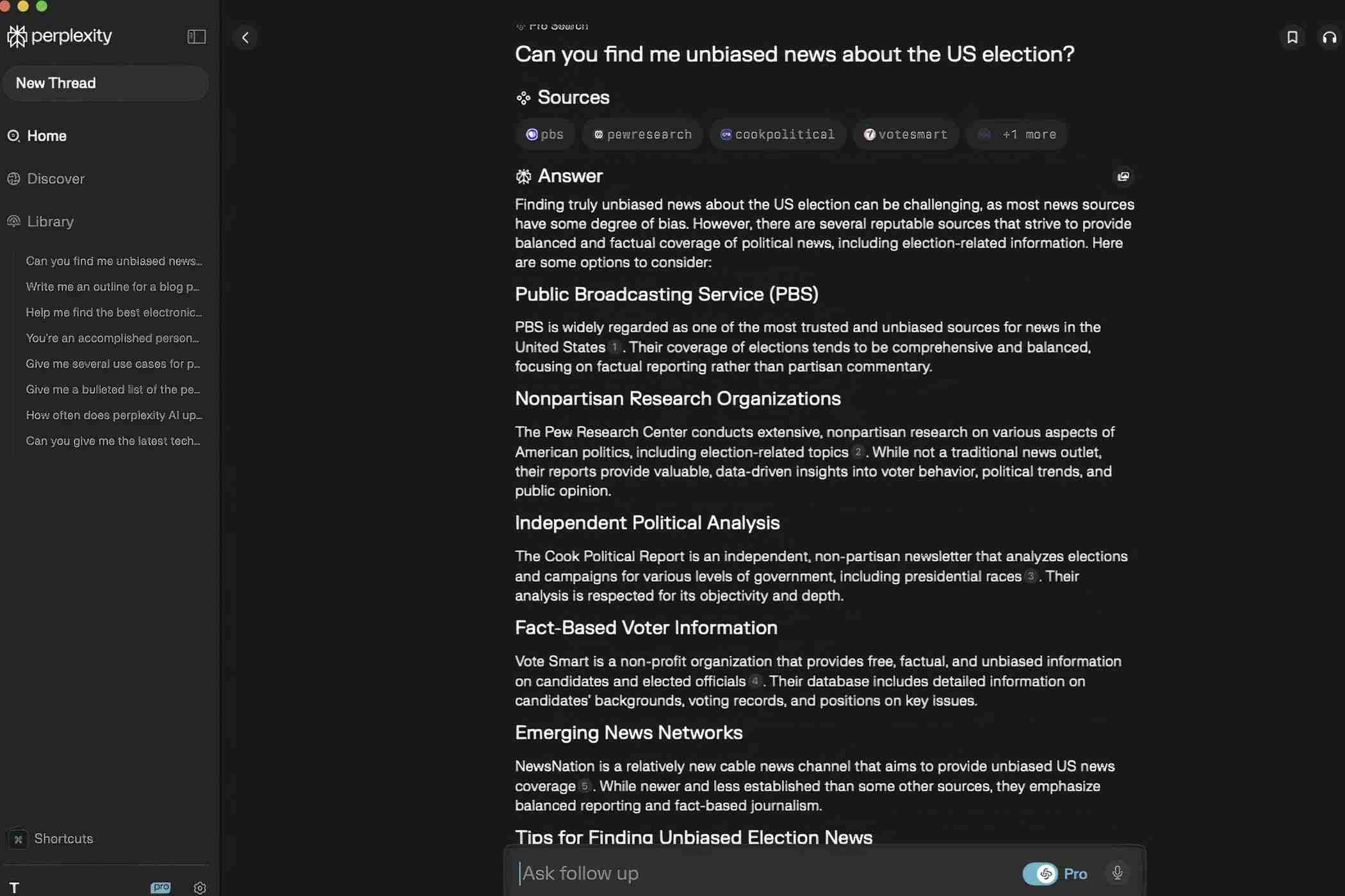
There are heaps of generative AI chatbots, all with different pros and cons. However, a few things set Perplexity AI apart from some other desktop AI assistants—at least for me. First is its built-in citation functionality.
✕ Remove AdsPerplexity lists several references at the top of each query when it provides an answer for you. As someone who does extensive research, I appreciate the ability to keep track of any source material Perplexity finds so I can vet it before using it.
Second, Perplexity also updates its information in real time, which means you'll get relevant answers to your questions and answers populated with the most up-to-date information.
Finally, there's the Copilot feature—an interactive search assistant that asks clarifying questions to help personalize the answers to your search queries. It's like having someone personally invested in finding the right answer for you.
Overall, the feature set is pretty rich. However, these few features are just the most prominent. Honestly, the quickest way to learn everything Perplexity can do is to try it for yourself.
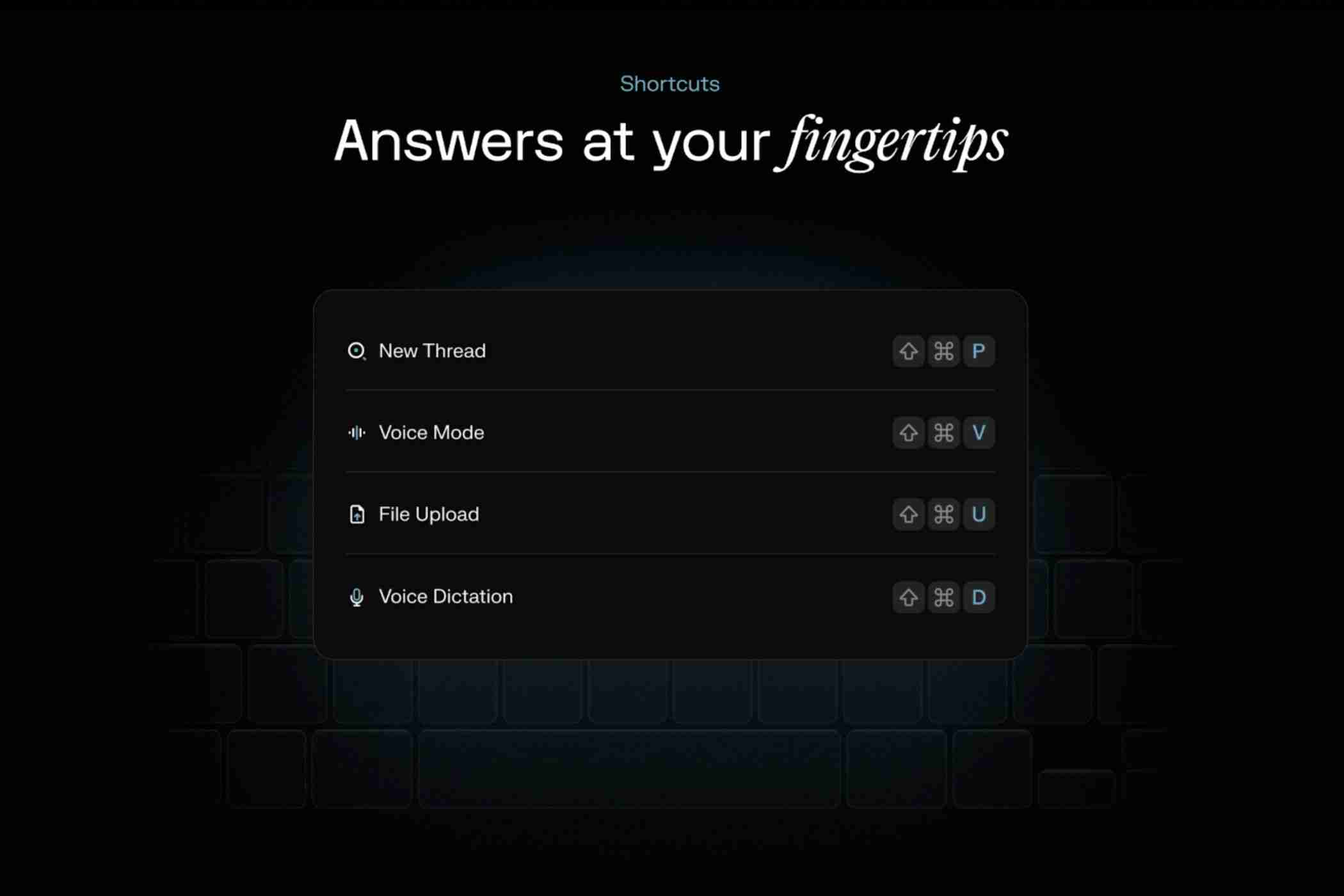 ✕ Remove Ads
✕ Remove Ads I use Perplexity in a few ways that might offer you some insight.
Recently, I was looking for a new harness for one of my dogs. Instead of trying to comb through several sites, I asked Perplexity to recommend the best dog harness in the US at the time. Perplexity not only found a great harness backed by various publications, but it also suggested a harness that I probably wouldn't have purchased had I just searched Amazon.
Last week, I asked Perplexity to help design a science-backed, evidence-based workout program. It came back with a pretty comprehensive list of suggestions. Could I have compiled all the science and eventually found best practices myself? Maybe. No doubt that would have taken me a significant chunk of time, though.
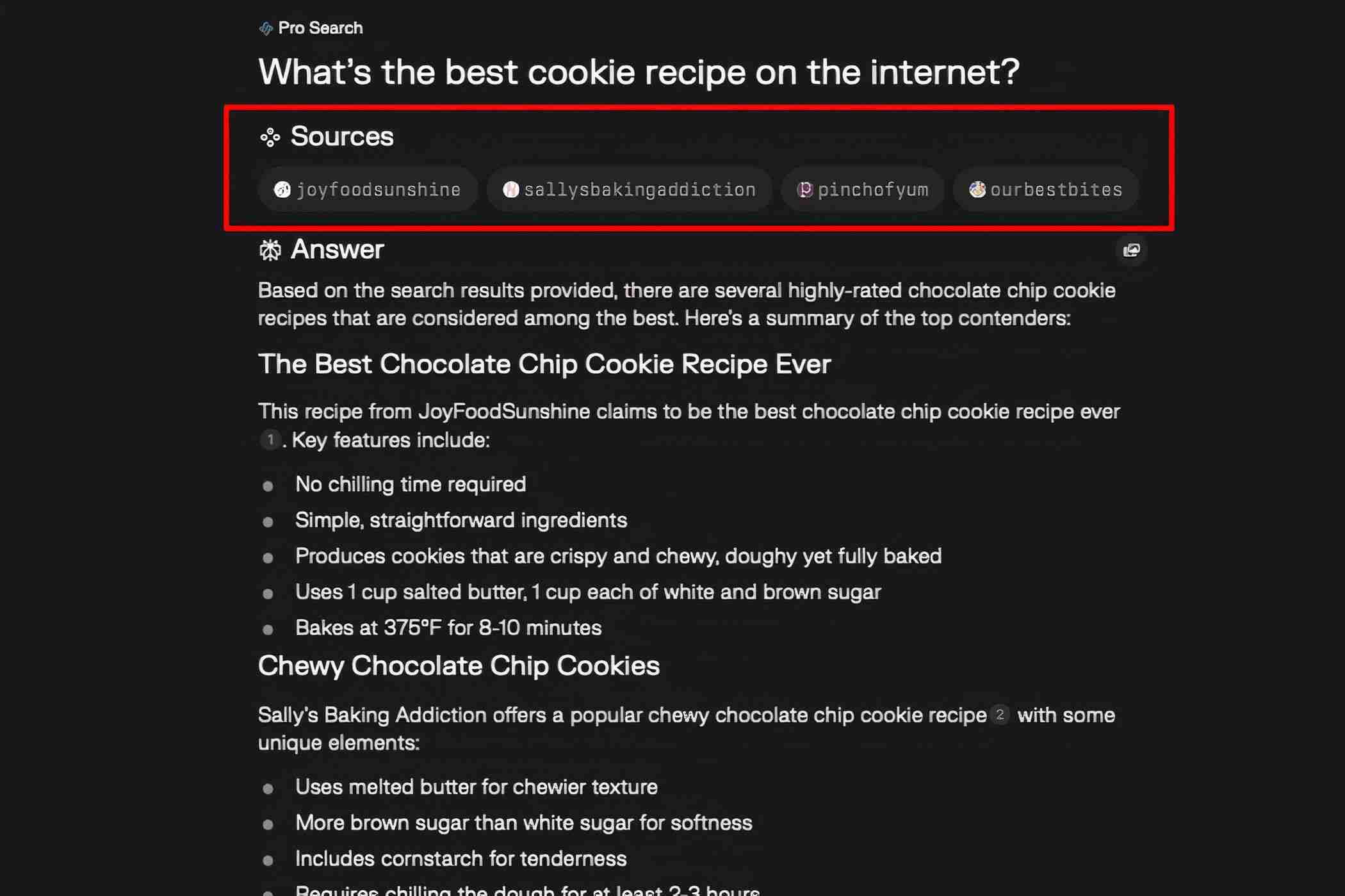 ✕ Remove Ads
✕ Remove Ads I asked Perplexity to assist, instead focusing on the information I needed and giving me a targeted list of credible sources I could review. By doing so, I saved myself countless hours I might have wasted just reading and analyzing extraneous information that didn't fit my science-backed criterion.
A desktop AI assistant will not replace the advice of a board-certified physician. Before you embark on any AI-generated fitness program, you should always consult your doctor.
Because Perplexity is primarily a predictive tool, it's great for textual analysis. This means it can find all manner of commonalities on the web if you ask it the right questions. I frequently ask Perplexity to generate a list of common SEO keywords on a topic, for example. Doing so helps me optimize my content to reach readers like you a bit more easily.
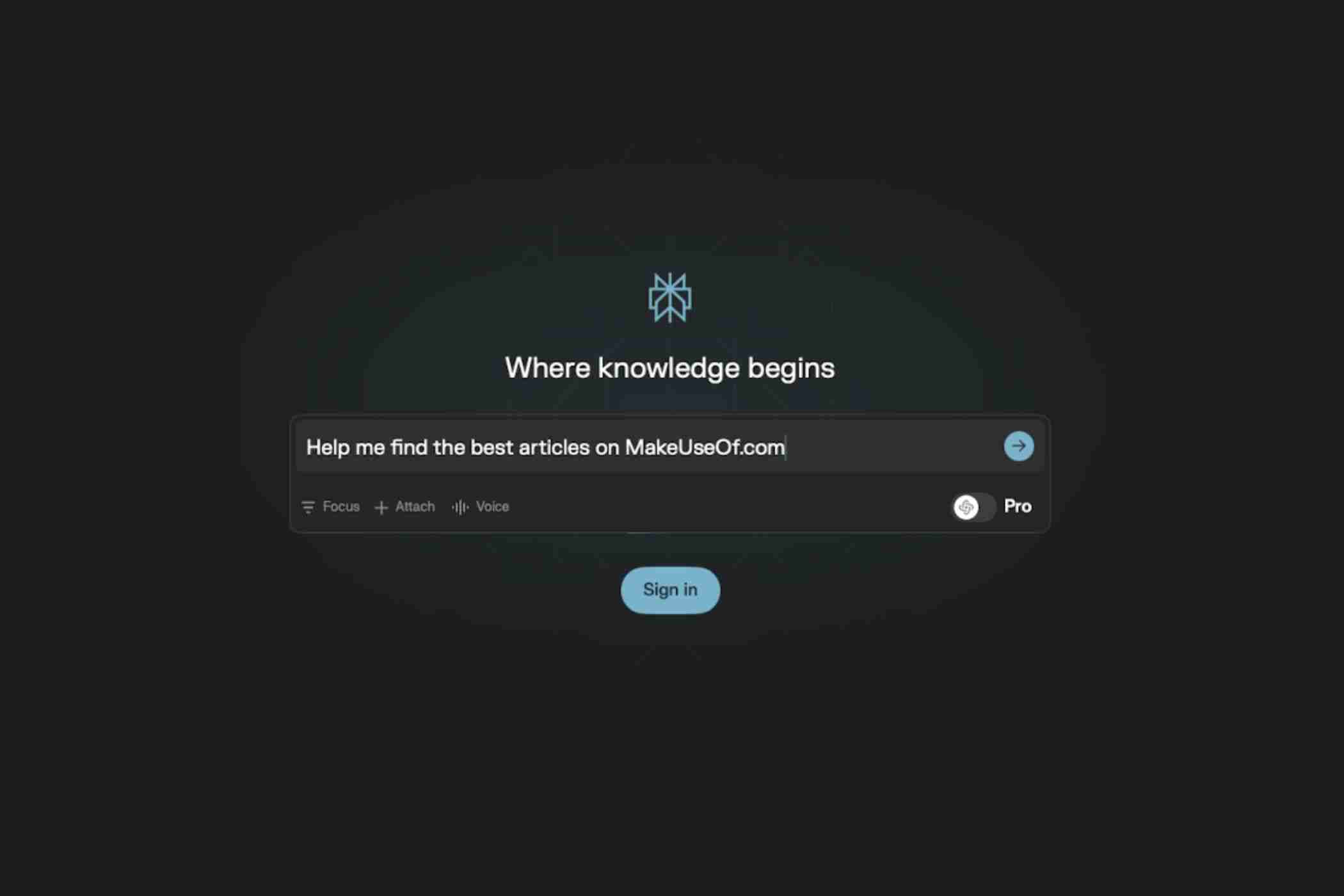 ✕ Remove Ads
✕ Remove Ads Ideally, Perplexity is best at sorting and organizing information in a way that allows for easy digestion. If you need to buy a new couch or do academic research on the best breakfast foods, the tool is an impeccable help. It doesn't do the work for you, per se, but it does cut some fluff and some of the time it takes to sort through information.
If you're going to use it, I'd suggest you replace your standard Google search with the tool for a week and see if the answers you get are more or less helpful. Moreover, Perplexity works better when you provide specific qualifiers in your queries.
Qualifiers such as "You're an AKC certified dog trainer" or "Help me find evidence-based research" are exceptionally useful. We've previously compiled a list of effective generative AI prompting techniques to maximize tools like Perplexity.
So we're clear: Perplexity isn't sponsoring this post. I just really like its AI tool. I've even purchased a year of the Pro subscription because I like it so much. You may not feel the same way I do.
✕ Remove AdsBefore encountering this AI assistant, I was horrified at the prospect of installing AI into my workflows. This is mainly because, as someone who writes for the web, I get a little bristly when it's suggested that AI will eventually replace me and the craft I've spent decades honing.
However, in holding to that bias against AI tools, I failed to see I'm not making myself more obsolete by using them. Instead, I've found Perplexity AI makes me more efficient and better informed. That means I get to do more of the work I want while avoiding some of the more time-consuming tasks I don't.
The above is the detailed content of I've Been Opposed to AI, but This App Is So Good I'm Changing My Mind. For more information, please follow other related articles on the PHP Chinese website!
 How to create a new folder in webstorm
How to create a new folder in webstorm
 How to solve the problem that document.cookie cannot be obtained
How to solve the problem that document.cookie cannot be obtained
 How to read carriage return in java
How to read carriage return in java
 cad break line command
cad break line command
 Introduction to interface types
Introduction to interface types
 Is Yiouoky a legal software?
Is Yiouoky a legal software?
 What are the SEO keyword ranking tools?
What are the SEO keyword ranking tools?
 What to do if the computer fakes death
What to do if the computer fakes death




